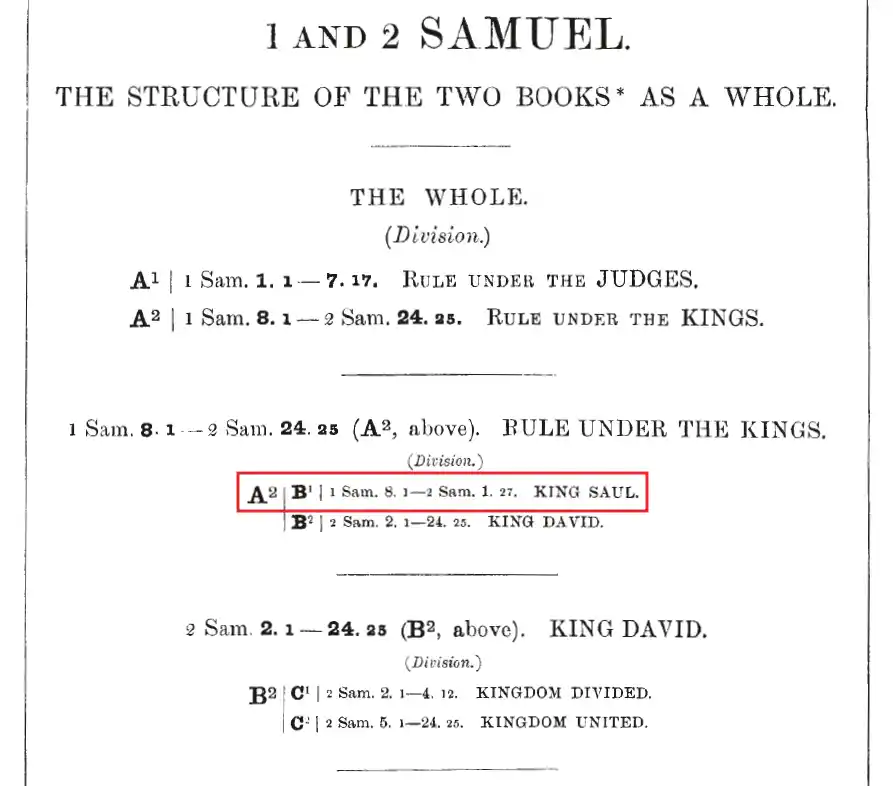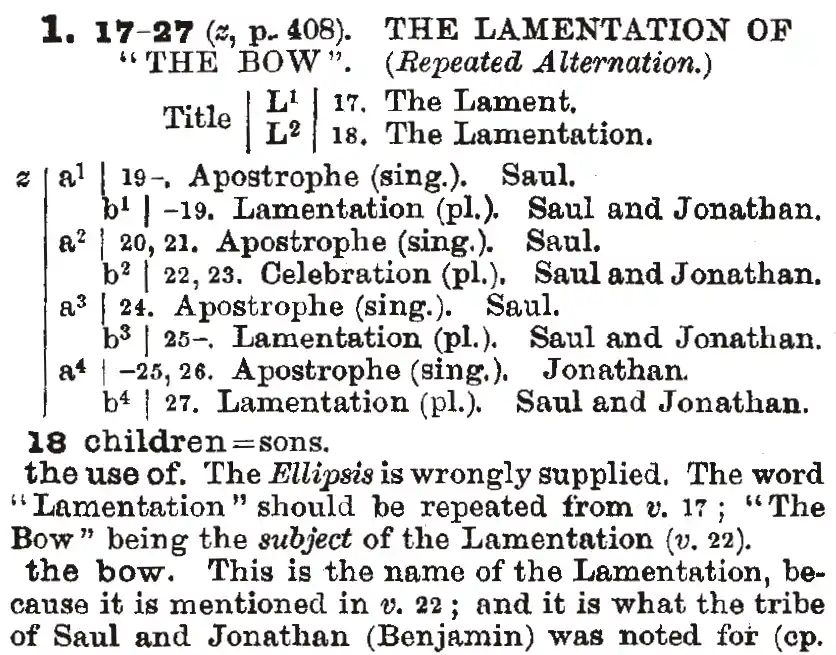View this page in 103 different languages!
- Introduction
- What do structural figures of speech do?
- God is in the details...
- The love of God
- Summary
INTRODUCTION
II Samuel 1:26 [kjv]I am distressed for thee, my brother Jonathan: very pleasant hast thou been unto me: thy love to me was wonderful, passing the love of women.
On first glance, it certainly does look like this bible verse supports a homosexual relationship between Jonathan and David.
But it can't be because it would be a blatant contradiction to Romans 1 for example, so we have to do a bit more research to find out what this verse really means.
There are only 2 fundamental ways the bible interprets itself: in the verse and in the context and once we see that, the verse has a very different meaning than what some people would like for it to have.
So we're going to start with the overall structure of the books of Samuel [the context] by analyzing the screenshot of the companion reference bible on the books of I & II Samuel.
Then we'll dig into the details of the verse later.
THE REVEALING NATURE OF STRUCTURAL FIGURES OF SPEECH
An extremely small percentage of christians even know about figures of speech, much less actually study them, yet there are well over 200 different types of figures of speech used in the bible and up to 40 different variations in one figure!That's because the devil has suppressed this knowledge to obscure the in-depth understanding of God's word.
Romans 1:18
For the wrath of God is revealed from heaven against all ungodliness and unrighteousness of men, who hold the truth in unrighteousness;
The word "hold" comes from the Greek word katechó [Strong's #2722] and means to supress; hold down; hinder; hold back; etc
As an example, look at these 2 screenshots from E.W. Bullinger's figures of speech book about the books of Samuel and the immediate context of II Samuel 1:26!

So as we can see, the overall context of the verse in question [II Samuel 1:26], is Rule under the kings>>King Saul.
Furthermore, the identity of Jesus Christ, as the red thread of the bible, in the books of I & II Samuel is the root and offspring of David.
Below is greater detail in the structure of the immediate context of II Samuel 1:26, revealing even more of the perfection, symmetry and order of God's word.

Now we just need to learn a few definitions of words to really get the depth of this:
Definition of lament:
verb (used with object)
to feel or express sorrow or regret for: to lament his absence>>to mourn for or over.
verb (used without object)
to feel, show, or express grief, sorrow, or regret>>to mourn deeply.
noun
an expression of grief or sorrow.
a formal expression of sorrow or mourning, especially in verse or song; an elegy or dirge.
Definition of dirge
noun
1. a funeral song or tune, or one expressing mourning in commemoration of the dead.
2. any composition resembling such a song or tune in character, as a poem of lament for the dead or solemn, mournful music: Tennyson's dirge for the Duke of Wellington.
3. a mournful sound resembling a dirge: The autumn wind sang the dirge of summer.
4. Ecclesiastical. the office of the dead, or the funeral service as sung.
When it comes to punctuation, we all know about the apostrophe, but here, to the average person like me, it didn't make any sense, so we just have to dig a little deeper.
Here is the word origin for apostrophe:
Origin of apostrophe
1580–1590; literally, apo- [away from] + stréphein to turn; [see strophe]
Definition of strophe:
noun
1. the part of an ancient Greek choral ode sung by the chorus when moving from right to left.
2. the movement performed by the chorus during the singing of this part.
3. the first of the three series of lines forming the divisions of each section of a Pindaric ode.
Now the context of II Samuel 1:26 is making a bit more sense, but what is an ode?
Definition of ode:
noun
1. a lyric poem typically of elaborate or irregular metrical form and expressive of exalted or enthusiastic emotion.
2. (originally) a poem intended to be sung.
Definition of pindaric:
adjective
1. of, relating to, or in the style of Pindar.
2. of elaborate form and metrical structure, as an ode or verse.
So now the question is: who is Pindar?
Pindar Latin: Pindarus; c. 518 – 438 BC) was an Ancient Greek lyric poet from Thebes. Of the canonical nine lyric poets of ancient Greece, his work is the best preserved.
"Almost all Pindar's victory odes are celebrations of triumphs gained by competitors in Panhellenic festivals such as the Olympian Games".
"Of this vast and varied corpus, only the epinikia – odes written to commemorate athletic victories – survive in complete form;"
Here is the amplified bible of verses 17 & 18:
17 Then David sang this dirge (funeral song) over Saul and his son Jonathan,
18 and he told them to teach the sons of Judah, the song of the bow. Behold, it is written in the Book of Jashar:
ENLIGHTENING DETAILS MAKE THE DIFFERENCE
Ecclesiastes 31 To every thing there is a season, and a time to every purpose under the heaven:
2 A time to be born, and a time to die; a time to plant, and a time to pluck up that which is planted;
3 A time to kill, and a time to heal; a time to break down, and a time to build up;
4 A time to weep, and a time to laugh; a time to mourn, and a time to dance;
5 A time to cast away stones, and a time to gather stones together; a time to embrace, and a time to refrain from embracing;
6 A time to get, and a time to lose; a time to keep, and a time to cast away;
7 A time to rend, and a time to sew; a time to keep silence, and a time to speak;
8 A time to love, and a time to hate; a time of war, and a time of peace.
THE LOVE OF GOD
II Samuel 1:26 [kjv]I am distressed for thee, my brother Jonathan: very pleasant hast thou been unto me: thy love to me was wonderful, passing the love of women.
In this verse, the word "love" is used twice and both times, its referring to the love of God, which is detailed in I Corinthians 13.
In the Septuagint, the Greek translation of the old testament, its the Greek word agape [Strong's #26], which can only originate from the gift of holy spirit and has nothing to do with homosexual love, which is counterfeit love.
Below you will see the 14 characteristics of the love of God, plus some additional information.
14 is 7 [the number of spiritual perfection] times 2 [the number of establishment or division, depending on context; here it is establishment, so we have spiritual perfection established in the love of God.
I Corinthians 13 [Amplified bible]
1 If I speak with the tongues of men and of angels, but have not love [for others growing out of God’s love for me], then I have become only a noisy gong or a clanging cymbal [just an annoying distraction].
2 And if I have the gift of prophecy [and speak a new message from God to the people], and understand all mysteries, and [possess] all knowledge; and if I have all [sufficient] faith so that I can remove mountains, but do not have love [reaching out to others], I am nothing.
3 If I give all my possessions to feed the poor, and if I surrender my body to be burned, but do not have love, it does me no good at all.
4 Love endures with patience and serenity, love is kind and thoughtful, and is not jealous or envious; love does not brag and is not proud or arrogant.
5 It is not rude; it is not self-seeking, it is not provoked [nor overly sensitive and easily angered]; it does not take into account a wrong endured.
6 It does not rejoice at injustice, but rejoices with the truth [when right and truth prevail].
7 Love bears all things [regardless of what comes], believes all things [looking for the best in each one], hopes all things [remaining steadfast during difficult times], endures all things [without weakening].
8 Love never fails [it never fades nor ends]. But as for prophecies, they will pass away; as for tongues, they will cease; as for the gift of special knowledge, it will pass away.
9 For we know in part, and we prophesy in part [for our knowledge is fragmentary and incomplete].
10 But when that which is complete and perfect comes, that which is incomplete and partial will pass away.
11 When I was a child, I talked like a child, I thought like a child, I reasoned like a child; when I became a man, I did away with childish things.
12 For now [in this time of imperfection] we see in a mirror dimly [a blurred reflection, a riddle, an enigma], but then [when the time of perfection comes we will see reality] face to face. Now I know in part [just in fragments], but then I will know fully, just as I have been fully known [by God].
13 And now there remain: faith [abiding trust in God and His promises], hope [confident expectation of eternal salvation], love [unselfish love for others growing out of God’s love for me], these three [the choicest graces]; but the greatest of these is love.